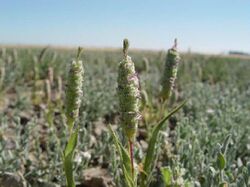Biology:Neostapfia
| Colusa grass | |
|---|---|

| |
| Scientific classification | |
| Kingdom: | Plantae |
| Clade: | Tracheophytes |
| Clade: | Angiosperms |
| Clade: | Monocots |
| Clade: | Commelinids |
| Order: | Poales |
| Family: | Poaceae |
| Subfamily: | Chloridoideae |
| Tribe: | Cynodonteae |
| Subtribe: | Orcuttiinae |
| Genus: | Neostapfia Burtt Davy |
| Species: | N. colusana
|
| Binomial name | |
| Neostapfia colusana Burtt Davy[1]
| |
| Synonyms[2] | |
| |
Neostapfia is a genus of endemic California n bunchgrasses, in the subfamily Chloridoideae of the grass family, Poaceae.[3][1][4][5][6] The only known species is Neostapfia colusana, with the common name Colusa grass.[1]
Distribution
Neostapfia colusana is endemic to the Central Valley of California , in the northern section's Sacramento Valley and in the southern section's San Joaquin Valley.[1] The bunchgrass grows in vernal pools, which are seasonal shallow freshwater ponds.
It is native to the Central Valley counties of Glenn, Colusa, Yolo, Solano, Stanislaus, and Merced.[7][8]
This rare grass is a federally listed threatened species in the United States.[9][3]
Description
Neostapfia colusana is a clumping bunchgrass with distinctive cylindrical inflorescences covered in flat spikelets. The inflorescences are said to resemble tiny ears of corn. They fruit in grains covered in a gluey secretion, and when a plant is mature, each clump becomes brown and sticky with the exudate. The genus was named for botanist Otto Stapf.
Conservation
The plant is limited to vernal pool habitats, a type of ecosystem that is increasingly rare as Central Valley land is consumed by development and agriculture, and damaged by flood-control regimens and other alterations of hydrology.[10]
References
- ↑ 1.0 1.1 1.2 1.3 Jepson (JM2): Neostapfia colusana
- ↑ Kew World Checklist of Selected Plant Families
- ↑ 3.0 3.1 USDA: Neostapfia colusana
- ↑ Davy, Joseph Burtt. 1898. "Stapfia, a new genus of Meliceae, and other noteworthy grasses." Erythea 6 (11): 109-113, text.
- ↑ Davy, Joseph Burtt. 1898. "Stapfia, a new genus of Meliceae, and other noteworthy grasses." Erythea 6 (11): plate 1, line drawings of Neostapfia colusana, named as Stapfia colusana
- ↑ Davy, Joseph Burtt 1899. "Concerning Stapfia." Erythea 7 (43)
- ↑ Calflora Database: Neostapfia colusana, with county distribution maps.
- ↑ Biota of North America Program 2013 county distribution maps for Neostapfia colusana
- ↑ The Calflora Database: Information on California plants for education, research and conservation, with data contributed by public and private institutions and individuals, including the Consortium of California Herbaria. 2015. Berkeley, California
- ↑ California Native Plant Society Rare Plant Profile
External links
- Calflora Database: Neostapfia colusana (Colusa grass, Colusagrass)
- Jepson eFlora (JM2): Neostapfia colusana
- Grass Manual Profile: Neostapfia
- The Nature Conservancy — Neostapfia colusana
- UC Photos gallery — Neostapfia colusana
Wikidata ☰ {{{from}}} entry
 |


